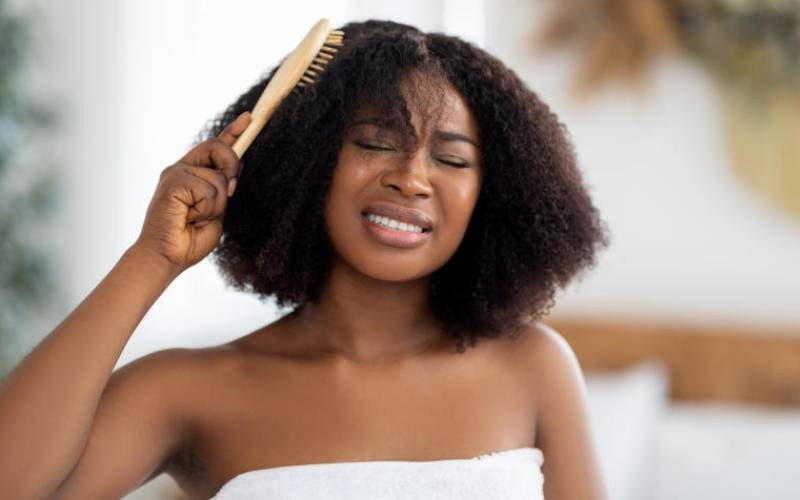.jpg)
Taking care of your 4C curls can be challenging, especially if you recently went natural. 4C hair is the ‘coiliest’ hair texture – made up of hair strands that have a very tight zig-zag pattern.
This hair type does not have a defined curl pattern – the pattern has to be defined by twisting or shingling. It is also the most fragile hair type and is prone to shrinkage and dryness.
Here are some of the best tips to help you take care of your 4C hair:
· Wash with care
The biggest mistake new natural hair enthusiasts make is washing their hair too frequently. Washing your 4C hair too frequently can lead to dryness, loss of natural sheen and breakage. It is perfectly OK to leave two to four weeks between cleanses.
While at it, make sure to avoid potentially harmful ingredients in your shampoo of choice. One of the biggest no-nos in shampoos is sulfate. Alternate between using a conditioner and sulfate-free shampoo to wash your hair.
To avoid tangling, always wash your hair in small parts. Pre-pooing your hair before you start your wash day is another fantastic strategy to avoid tangling. Before jumping into the shower, apply an oil or conditioner to your hair and gently detangle it with your fingertips.
.jpg)
· Moisturise, moisturise, moisturise
As we have noted, 4C hair is particularly prone to dryness. Its tight kinks prevent the flow of sebum through the hair strand. As such, it requires being moisturised even more than other hair types.
Invest in a good hair moisturise for kinky hair. Moisturisers that specifically cater to kinky hair are often thicker than regular moisturisers. You may have to experiment with different moisturisers to find one that works best for your hair.
After moisturising your hair, make sure to seal it. The best sealants for 4C hair include coconut oil, avocado oil, and shea butter. Even if your hair is in a protective style, moisturise it frequently to keep it healthy.
· Detangle your hair
As laborious as it may be, 4C hair must be detangled on a regular basis. Because of the tight curl pattern, the hair tangles significantly more quickly than other types. Your hair will become matted and break if you do not detangle it properly.
Detangling 4C hair is a delicate task. The best way to do it is by using your fingers instead of a comb. Gently detangle damp hair with your fingers, gently separating the hair strands with your fingertips. To aid in this process, apply a conditioner with lots of slip.
When you encounter knots in your hair, do not rip them out – detangle them gently. Detangle your hair in sections and secure it to prevent it from tangling up all over again. After you have finished finger-detangling, comb your hair with a wide-toothed comb.
.jpg)
· Deep condition your hair
Deep conditioning is a must for 4C hair. To keep your hair healthy, deep condition it once a week and follow with a hot oil treatment to seal in moisture.
One of the best oils for hot oil therapy is Jamaican Black Castor Oil. Simply heat the oil in the microwave until it reaches a comfortable temperature before applying it to your hair and scalp. Cover your hair with a shower cap and a towel and let it sit.
· Pay attention to product ingredients
Not all hair products are made equal, and not all hair products are suitable for 4C hair. The worst ingredients in hair products include sulfates, silicones, and parabens. Also, avoid gels containing alcohol and leave-in conditioners containing mineral oils.
Many naturalistas have had success with products that include only natural ingredients such as shea butter, coconut, avocado, and jojoba oils. Experiment with different natural hair products to find out what works best for your hair.
· Cover your hair at night
Since 4C hair is prone to dryness, it needs extra protection at night. Your cotton pillowcases and bedsheets can absorb moisture from your hair and leave it dull and dry.
When you sleep on cotton beddings, your hair will also twist, matte, and become matted from friction. To keep your hair moisturised and detangled, wrap it up in a silk bonnet.
 The Standard Group Plc is a multi-media organization with investments in media platforms spanning newspaper print
operations, television, radio broadcasting, digital and online services. The Standard Group is recognized as a
leading multi-media house in Kenya with a key influence in matters of national and international interest.
The Standard Group Plc is a multi-media organization with investments in media platforms spanning newspaper print
operations, television, radio broadcasting, digital and online services. The Standard Group is recognized as a
leading multi-media house in Kenya with a key influence in matters of national and international interest.













